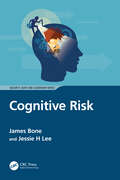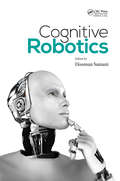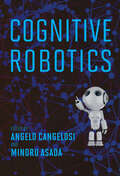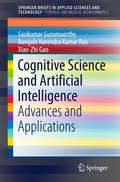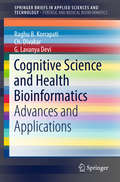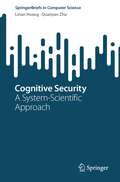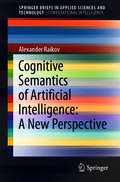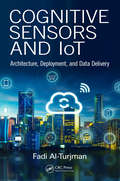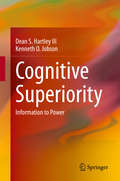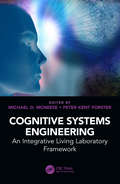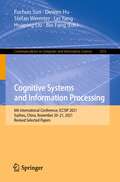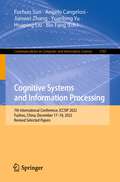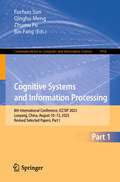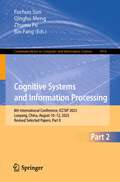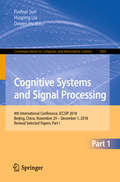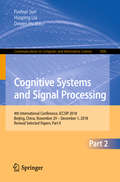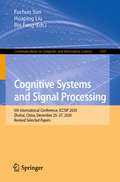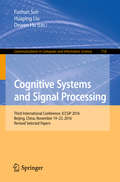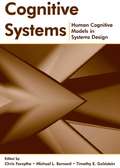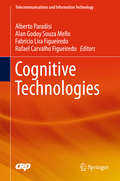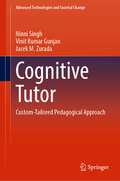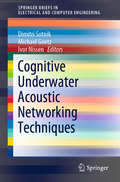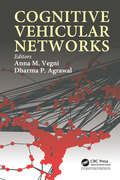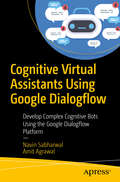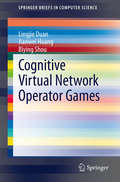- Table View
- List View
Cognitive Risk (Security, Audit and Leadership Series)
by James Bone Jessie H LeeCognitive Risk is a book about the least understood but most pervasive risk to mankind – human decision-making. Cognitive risks are subconscious and unconscious influence factors on human decision-making: heuristics and biases. To understand the scope of cognitive risk, we look at case studies, corporate and organizational failure, and the science that explains why we systemically make errors in judgment and repeat the same errors. The book takes a multidisciplinary and pedestrian stroll through behavioral science with a light touch, using stories to explain why we consistently make cognitive errors that not only increase risks but also simultaneously fail to recognize these errors in ourselves or our organizations. This science has deep roots in organizational behavior, psychology, human factors, cognitive science, and behavioral science all influenced by classic philosophers and enabled through advanced analytics and artificial intelligence. The point of the book is simple. Humans persist with bounded rationality, but as the speed of information, data, money, and life in general accelerates, we will need the right tools to not only keep pace but to survive and thrive. In light of all these factors that complicate risk, the book offers a foundational solution. A cognitive risk framework for enterprise risk management and cyber security. There are five pillars in a cognitive risk framework with five levels of maturity, yet there is no universally prescribed maturity level. It is more a journey of different paths. Each organization will pursue its own path, but the goal is the same – to minimize the errors that could have been avoided. We explain why risks are hard to discuss and why we systematically ignore the aggregation of these risks hidden in collective decision-making in an organization. The cognitive risk framework is a framework designed to explore the two most complex risks organizations face: uncertainty and decision-making under uncertainty. The first pillar is cognitive governance, which is a structured approach for institutionalizing rational decision-making across the enterprise. Each pillar is complimentary and builds on the next in a succession of continuous learning. There is no endpoint because the pillars evolve with technology. Enterprise risk is a team effort in risk intelligence grounded in a framework for good decision-making. We close with a call to become designers of risk solutions enabled by the right technology and nurtured by collaboration. We hope you enjoy the book with this context.
Cognitive Robotics
by Hooman SamaniThe kimono-clad android robot that recently made its debut as the new greeter at the entrance of Tokyo's Mitsukoshi department store is just one example of the rapid advancements being made in the field of robotics.Cognitive robotics is an approach to creating artificial intelligence in robots by enabling them to learn from and respond to real-worl
Cognitive Robotics (Intelligent Robotics and Autonomous Agents series)
by Angelo Cangelosi and Minoru AsadaThe current state of the art in cognitive robotics, covering the challenges of building AI-powered intelligent robots inspired by natural cognitive systems.A novel approach to building AI-powered intelligent robots takes inspiration from the way natural cognitive systems—in humans, animals, and biological systems—develop intelligence by exploiting the full power of interactions between body and brain, the physical and social environment in which they live, and phylogenetic, developmental, and learning dynamics. This volume reports on the current state of the art in cognitive robotics, offering the first comprehensive coverage of building robots inspired by natural cognitive systems. Contributors first provide a systematic definition of cognitive robotics and a history of developments in the field. They describe in detail five main approaches: developmental, neuro, evolutionary, swarm, and soft robotics. They go on to consider methodologies and concepts, treating topics that include commonly used cognitive robotics platforms and robot simulators, biomimetic skin as an example of a hardware-based approach, machine-learning methods, and cognitive architecture. Finally, they cover the behavioral and cognitive capabilities of a variety of models, experiments, and applications, looking at issues that range from intrinsic motivation and perception to robot consciousness. Cognitive Robotics is aimed at an interdisciplinary audience, balancing technical details and examples for the computational reader with theoretical and experimental findings for the empirical scientist.
Cognitive Science and Artificial Intelligence: Advances and Applications (SpringerBriefs in Applied Sciences and Technology)
by Xiao-Zhi Gao Sasikumar Gurumoorthy Bangole Narendra Kumar RaoThis book presents interdisciplinary research on cognition, mind and behavior from an information processing perspective. It includes chapters on Artificial Intelligence, Decision Support Systems, Machine Learning, Data Mining and Support Vector Machines, chiefly with regard to the data obtained and analyzed in Medical Informatics, Bioinformatics and related disciplines. The book reflects the state-of-the-art in Artificial Intelligence and Cognitive Science, and covers theory, algorithms, numerical simulation, error and uncertainty analysis, as well novel applications of new processing techniques in Biomedical Informatics, Computer Science and its applied areas. As such, it offers a valuable resource for students and researchers from the fields of Computer Science and Engineering in Medicine and Biology.
Cognitive Science and Health Bioinformatics: Advances and Applications (SpringerBriefs in Applied Sciences and Technology)
by Raghu B. Korrapati Ch. Divakar G. Lavanya DeviThis book highlights the interdisciplinary study of cognition, mind and behavior from an information processing perspective, and describes related applications to health informatics. The respective chapters address health problem-solving and education, decision support systems, user-centered interfaces, and the design and use of controlled medical terminologies. Reflecting cutting-edge research on computational methods - including theory, algorithms, numerical simulation, error and uncertainty analysis, and their applications - the book offers a valuable resource for doctoral students and researchers in the fields of Computer Science and Engineering.
Cognitive Security: A System-Scientific Approach (SpringerBriefs in Computer Science)
by Quanyan Zhu Linan HuangThis book presents the latest research in cognitive security, a rapidly emerging field that addresses the vulnerabilities in human behavior and cognition that can lead to Cyber-Physical Systems (CPS) compromise. This book demonstrates that as adversaries increasingly use manipulative and deceptive information to disrupt human cognitive processes, including sensation, attention, memory, and mental operations, humans are misled into fallacious reasoning and manipulated decisions that can lead to system-level meltdown. Cognitive security aims to protect humans from the exploitation of cognitive vulnerabilities, help them make informed decisions that are free from manipulation and undue influence, and mitigate the aggravating risk in the ensuing steps of the attacker’s kill chain. This book offers solutions that work across different fields, such as psychology, neuroscience, data science, social science, and game theory, to deal with cognitive threats. It guides the reader through the core ideas with figures, real-life examples, and case studies. Moreover, it formally defines all research questions, presents the results using mathematical theorems and proofs, and obtains insights through numerical validation. This book provides a self-contained and brief overview of essential system-scientific tools for modeling, analyzing, and mitigating cognitive vulnerabilities. The concepts of human cognitive capacities and cognitive vulnerabilities are formally discussed, followed by two case studies in the scenarios of reactive and proactive attention vulnerabilities. This book provides insights and applications on this transdisciplinary topic, with the goal of motivating future research in this emerging area and pushing the frontier of human-technology convergence. This book is a valuable reference for researchers and advanced-level students studying or working in cognitive security and related fields. It is also useful for decision-makers, managers, and professionals working within these related fields.
Cognitive Semantics of Artificial Intelligence: A New Perspective (SpringerBriefs in Applied Sciences and Technology)
by Alexander RaikovThis book addresses the issue of cognitive semantics’ aspects that cannot be represented by traditional digital and logical means. The problem of creating cognitive semantics can be resolved in an indirect way. The electromagnetic waves, quantum fields, beam of light, chaos control, relativistic theory, cosmic string recognition, category theory, group theory, and so on can be used for this aim. Since the term artificial intelligence (AI) appeared, various versions of logic have been created; many heuristics for neural networks deep learning have been made; new nature-like algorithms have been suggested. At the same time, the initial digital, logical, and neural network principles of representation of knowledge in AI systems have not changed a lot. The researches of these aspects of cognitive semantics of AI are based on the author's convergent methodology, which provides the necessary conditions for purposeful and sustainable convergence of decision-making.
Cognitive Sensors and IoT: Architecture, Deployment, and Data Delivery
by Fadi Al-TurjmanThis book presents the Cognitive Information Centric Sensor Network (CICSN) framework for the IoT. This framework is built on top of cognitive nodes, capable of knowledge representation, learning, and reasoning, along with an information-centric approach for data delivery. <P><P> It also discusses the most appropriate deployment strategy for these cognitive nodes under realistic assumptions that cares about the Quality of Information (QoI). In addition, it uses a QoI aware data delivery strategy, with Analytic Hierarchy Process (AHP) as the reasoning technique to identify data delivery paths that dynamically adapt to changing network conditions and user requirements.
Cognitive Superiority: Information to Power
by Dean S. Hartley III Kenneth O. JobsonIn a world of accelerating unending change, perpetual surveillance, and increasing connectivity, conflict has become ever more complex. Wars are no longer limited to the traditional military conflict domains—land, sea, air; even space and cyber space. The new battlefield will be the cognitive domain and the new conflict a larger contest for power; a contest for cognitive superiority. Written by experts in military operations research and neuropsychology, this book introduces the concept of cognitive superiority and provides the keys to succeeding within a complex matrix where the only rules are the laws of physics, access to information, and the boundaries of cognition.The book describes the adversarial environment and how it interacts with the ongoing, accelerating change that we are experiencing, irrespective of adversaries. It talks about the ascendant power of information access, pervasive surveillance, personalized persuasion, and emerging new forms of cognition. It profiles salient technologies and science, including persuasion science, artificial intelligence and machine learning (AI/ML), surveillance technologies, complex adaptive systems, network science, directed human modification, and biosecurity. Readers will learn about human and machine cognition, what makes it tick, and why and how we and our technologies are vulnerable.Following in the tradition of Sun-Tsu and von Clausewitz, this book writes a new chapter in the study of warfare and strategy. It is written for those who lead, aspire to leadership, and those who teach or persuade, especially in the fields of political science, military science, computer science, and business.
Cognitive Systems Engineering: An Integrative Living Laboratory Framework
by Michael D. McNeese Peter Kent ForsterThis book provides a framework for integrating complex systems that are problem-centric, human-centered, and provides an interdisciplinary, multi-methodological purview of multiple perspectives surrounding the human factors/human actors within living ecosystems. This book will provide useful theoretical and practical information to human factors, human-computer interaction, cognitive systems engineering personnel who are currently engaged in human-centered design or other applied aspects of modeling, simulation, and design that requires joint understanding of theory and practice.
Cognitive Systems and Information Processing: 6th International Conference, ICCSIP 2021, Suzhou, China, November 20–21, 2021, Revised Selected Papers (Communications in Computer and Information Science #1515)
by Huaping Liu Lei Yang Fuchun Sun Dewen Hu Stefan Wermter Bin FangThis book constitutes the refereed post-conference proceedings of the 6th International Conference on Cognitive Systems and Signal Processing, ICCSIP 2021, held in Suzhou, China, in November 2021.The 41 revised papers presented were carefully reviewed and selected from 105 submissions. The papers are organized in topical sections on algorithm; vision; and robotics and application.
Cognitive Systems and Information Processing: 7th International Conference, ICCSIP 2022, Fuzhou, China, December 17-18, 2022, Revised Selected Papers (Communications in Computer and Information Science #1787)
by Angelo Cangelosi Huaping Liu Fuchun Sun Bin Fang Jianwei Zhang Yuanlong YuThis book constitutes the refereed proceedings of the 7th International Conference on Cognitive Systems and Information Processing, ICCSIP 2022, held in Fuzhou, China, during November 18–20, 2022.The 47 papers included in this book were carefully reviewed and selected from 121 submissions. They were organized in the following topical sections as follows: Award; Algorithm; Application; Manipulation & Control; Hardware and Vision.
Cognitive Systems and Information Processing: 8th International Conference, ICCSIP 2023, Luoyang, China, August 10–12, 2023, Revised Selected Papers, Part I (Communications in Computer and Information Science #1918)
by Fuchun Sun Bin Fang Qinghu Meng Zhumu FuThe two-volume set CCIS 1918 and 1919 constitutes the refereed post-conference proceedings of the 8th International Conference on Cognitive Systems and Information Processing, ICCSIP 2023, held in Luoyang, China, during August 10–12, 2023. The 52 full papers presented in these proceedings were carefully reviewed and selected from 136 submissions. The papers are organized in the following topical sections: Volume I : Award; Algorithm & Control; and Application.Volume II: Robotics & Bioinformatics; and Vision.
Cognitive Systems and Information Processing: 8th International Conference, ICCSIP 2023, Luoyang, China, August 10–12, 2023, Revised Selected Papers, Part II (Communications in Computer and Information Science #1919)
by Fuchun Sun Bin Fang Qinghu Meng Zhumu FuThe two-volume set CCIS 1918 and 1919 constitutes the refereed post-conference proceedings of the 8th International Conference on Cognitive Systems and Information Processing, ICCSIP 2023, held in Luoyang, China, during August 10–12, 2023. The 52 full papers presented in these proceedings were carefully reviewed and selected from 136 submissions. The papers are organized in the following topical sections: Volume I : Award; Algorithm & Control; and Application.Volume II: Robotics & Bioinformatics; and Vision.
Cognitive Systems and Signal Processing: 4th International Conference, ICCSIP 2018, Beijing, China, November 29 - December 1, 2018, Revised Selected Papers, Part I (Communications in Computer and Information Science #1005)
by Huaping Liu Fuchun Sun Dewen HuThis two-volume set (CCIS 1005 and CCIS 1006) constitutes the refereed proceedings of the 4th International Conference on Cognitive Systems and Signal Processing, ICCSIP2018, held in Beijing, China, in November and December 2018.The 96 revised full papers presented were carefully reviewed and selected from 169 submissions. The papers are organized in topical sections on vision and image; algorithms; robotics; human-computer interaction; deep learning; information processing and automatic driving.
Cognitive Systems and Signal Processing: 4th International Conference, ICCSIP 2018, Beijing, China, November 29 - December 1, 2018, Revised Selected Papers, Part II (Communications in Computer and Information Science #1006)
by Huaping Liu Fuchun Sun Dewen HuThis two-volume set (CCIS 1005 and CCIS 1006) constitutes the refereed proceedings of the 4th International Conference on Cognitive Systems and Signal Processing, ICCSIP2018, held in Beijing, China, in November and December 2018.The 96 revised full papers presented were carefully reviewed and selected from 169 submissions. The papers are organized in topical sections on vision and image; algorithms; robotics; human-computer interaction; deep learning; information processing and automatic driving.
Cognitive Systems and Signal Processing: 5th International Conference, ICCSIP 2020, Zhuhai, China, December 25–27, 2020, Revised Selected Papers (Communications in Computer and Information Science #1397)
by Huaping Liu Fuchun Sun Bin FangThis book constitutes the refereed post-conference proceedings of the 5th International Conference on Cognitive Systems and Signal Processing, ICCSIP 2020, held in Zhuhai, China, in December 2020. The 59 revised papers presented were carefully reviewed and selected from 120 submissions. The papers are organized in topical sections on algorithm; application; manipulation; bioinformatics; vision; and autonomous vehicles.
Cognitive Systems and Signal Processing: Third International Conference, ICCSIP 2016, Beijing, China, November 19–23, 2016, Revised Selected Papers (Communications in Computer and Information Science #710)
by Huaping Liu Fuchun Sun Dewen HuThis book constitutes the refereed proceedings of the Third International Conference on Cognitive Systems and Signal Processing, ICCSIP2016, held in Beijing, China, in December 2016. The 59 revised full papers presented were carefully reviewed and selected from 171 submissions. The papers are organized in topical sections on Control and Decision; Image and Video; Machine Learning; Robotics; Cognitive System; Cognitive Signal Processing.
Cognitive Systems: Human Cognitive Models in Systems Design (Human Factors And Ergonomics Ser.)
by Chris Forsythe Michael L. Bernard Timothy E. GoldsmithThe leading thinkers from the cognitive science tradition participated in a workshop sponsored by Sandia National Laboratories in July of 2003 to discuss progress in building their models. The goal was to summarize the theoretical and empirical bases for cognitive systems and to present exemplary developments in the field. Following the workshop, a great deal of planning went into the creation of this book. Eleven of the twenty-six presenters were asked to contribute chapters, and four chapters are the product of the breakout sessions in which critical topics were discussed among the participants. An introductory chapter provides the context for this compilation.Cognitive Systems thus presents a unique merger of cognitive modeling and intelligent systems, and attempts to overcome many of the problems inherent in current expert systems. It will be of interest to researchers and students in the fields of cognitive science, computational modeling, intelligent systems, artificial intelligence, and human-computer interaction.
Cognitive Technologies (Telecommunications and Information Technology)
by Alberto Paradisi Fabrício Lira Figueiredo Alan Godoy Souza Mello Rafael Carvalho FigueiredoThis book focuses on the next generation optical networks as well as mobile communication technologies. The reader will find chapters on Cognitive Optical Network, 5G Cognitive Wireless, LTE, Data Analysis and Natural Language Processing. It also presents a comprehensive view of the enhancements and requirements foreseen for Machine Type Communication. Moreover, some data analysis techniques and Brazilian Portuguese natural language processing technologies are also described here.
Cognitive Tutor: Custom-Tailored Pedagogical Approach (Advanced Technologies and Societal Change)
by Vinit Kumar Gunjan Jacek M. Zurada Ninni SinghThis book illustrates the design, development, and evaluation of personalized intelligent tutoring systems that emulate human cognitive intelligence by incorporating artificial intelligence. Artificial intelligence is an advanced field of research. It is particularly used in the field of education to increase the effectiveness of teaching and learning techniques. With the advancement of internet technology, there is a rapid growth in web based distance learning modality. This mode of learning is better known as the e-learning system. These systems present low intelligence because they offer a pre-identified learning frame to their learners. The advantage of these systems is to offer to learn anytime and anyplace without putting emphasis on a learner's needs, competency level, and previous knowledge. Every learner has different grasping levels, previous knowledge, and preferred mode of learning, and hence, the learning process of one individual may significantly vary from other individuals. This book provides a complete reference for students, researchers, and industry practitioners interested in keeping abreast of recent advancements in this field. It encompasses cognitive intelligence and artificial intelligence which are very important for deriving a roadmap for future research on intelligent systems.
Cognitive Underwater Acoustic Networking Techniques (SpringerBriefs in Electrical and Computer Engineering)
by Michael Goetz Ivor Nissen Dimitri SotnikThis book summarizes the latest research on cognitive network-layer methods and smart adaptive physical-layer methods in underwater networks. Underwater communication requires extendable and delay-tolerant underwater acoustic networks capable of supporting multiple frequency bands, data rates and transmission ranges. The book also discusses a suitable foreground communication stack for mixed mobile/static networks, a technology that requires adaptive physical layer waveforms and cognitive network strategies with underlying cooperative and non-cooperative robust processes. The goal is to arrive at a universally applicable standard in the area of Underwater Internet-of-Things [ISO/IEC 30140, 30142, 30143].
Cognitive Vehicular Networks
by Anna Maria Vegni Dharma P. AgrawalA comprehensive text on both current and emerging areas of cognitive vehicular networks, this book focuses on a new class of mobile ad hoc networks. It uses a pedagogical approach utilizing cognitive aspects applied to vehicular environments and comprises contributions from well-known and high profile researchers in their respective specialties. The book provides significant technical and practical insights on different perspectives, starting from a basic background on cognitive radio, interrelated technologies, application to vehicular networks, technical challenges, and future trends.
Cognitive Virtual Assistants Using Google Dialogflow: Develop Complex Cognitive Bots Using the Google Dialogflow Platform
by Navin Sabharwal Amit AgrawalFollow a step-by-step, hands-on approach to building production-ready enterprise cognitive virtual assistants using Google Dialogflow. This book provides an overview of the various cognitive technology choices available and takes a deep dive into cognitive virtual agents for handling complex real-life use cases in various industries such as travel and weather. You’ll delve deeper into the advanced features of cognitive virtual assistants implementing features such as input/output context, follow-up intents, actions and parameters, and handling complex multiple intents. You’ll learn how to integrate with third-party messaging platforms by integrating your cognitive bot with Facebook messenger. You’ll also integrate with third-party APIs to enrich your cognitive bots using webhooks. Cognitive Virtual Assistants Using Google Dialogflow takes the complexity out of the cognitive platform and provides rich guidance which you can use when developing your own cognitive bots. The book covers Google Dialogflow in-depth and starts with the basics, serving as a hands-on guide for developers who are starting out on their journey with Google Dialogflow. All the code presented in the book will be available in the form of scripts and configuration files, which allows you to try out the examples and extend them in interesting ways.What You Will LearnDevelop cognitive bots with Google Dialogflow technologyUse advanced features to handle complex conversation scenariosEnrich the bot’s conversations by understanding the sentiment of the userSee best practices for developing cognitive botsEnhance a cognitive bot by integrating with third-party services Who This Book Is For AI and ML developers.
Cognitive Virtual Network Operator Games (SpringerBriefs in Computer Science)
by Jianwei Huang Lingjie Duan Biying ShouThis SpringerBrief provides an overview of cognitive mobile virtual network operator's (C-MVNO) decisions under investment flexibility, supply uncertainty, and market competition in cognitive radio networks. This is a new research area at the nexus of cognitive radio engineering and microeconomics. The authors focus on an operator's joint spectrum investment and service pricing decisions. The readers will learn how to tradeoff the two flexible investment choices (dynamic spectrum leasing and spectrum sensing) under supply uncertainty. Furthermore, if there is more than one operator, we present analysis of the competition among operators in obtaining spectrum and pricing services to attract users. The brief is designed for professionals working with C-MVNOs. Succinct and practical, it will assist them in making optimal investments and pricing decisions. It will also be of interest to researchers.
